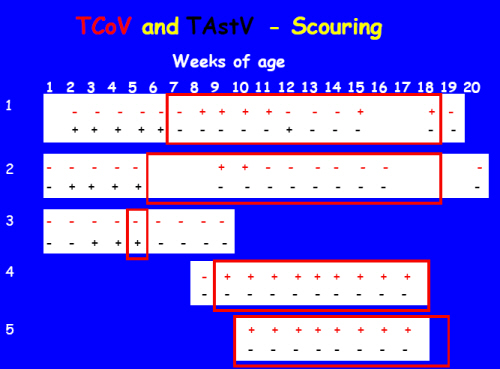



Turkey Coronavirus and Astrovirus in Britain
A study into the prevalence of turkey coronavirus and astrovirus in Britain found that the disease was most common in young birds aged between three and 18 weeks, writes Chris Harris, Senior Editor for ThePoultrySite.Turkey coronavirus, an acute and highly contagious enteric disease that results in economic losses on turkey farms was seen initially in the USA in the 1990's. Studies in the US showed that the condition led to poor fed conversion, poor weight gain and an increase in the use of medication.
The studies in the US also showed that the condition caused poultry enteritis mortality syndrome (PEMS) in the young birds with the most deaths spiking at about 19 days of age.
Speaking at the British Poultry Council Turkey Research Conference, Dr Francesca Day, who now works with the Department of the Environment Food and Rural Affairs, said that the economic consequences for the outbreaks in the US were that mortality could be very high, dependent on factors such as the viral load or the presence of bacteria. Turkey coronavirus (TCoV) brought the survival in the flocks down from 93 per cent to 86 per cent.
Dr Day said that it had been proved in the US that Turkey coronavirus and astrovirus, which is an immunosuppressive, was often associated with other disease and a UK study was established to discover the prevalence in Britain and the effects the conditions were having on turkey flocks.
The disease, TCoV was first confirmed in Britain in 2001. The incidence found it in 13 day old poults with 20 per cent showing symptoms of stunting, unevenness and lameness and a mortality rate of four per cent.
The UK experiment looked at the frequency of TCoV and TAstV in flocks across England and Wales. It looked to find out whether the conditions were associated with other disease, a what age the birds were infected and what percentage of one-off scouring cases are associated with the condition. The study also looked at how many genotypes of TCoV and TAstV are circulating in Britain.
The studies took samples on a weekly basis from poults aged from one day to 20 days at a specific site and random samples were also taken from birds at any age when they showed signs of scouring. Sera was also taken from 10 birds at one day, 10 weeks and 20 weeks.
"Between 300 and 500 samples were taken and processed through extracts from the faeces," Dr Day said. "We took all the steps to avoid cross contamination in the labs."
The lab tests were able to detect the amount of infectious virus in each sample.
In the tests on the randomly selected birds that were scouring, 11 of the 34 flocks tested were TCoV positive. In the longitudinal tests where the birds were tested from one to 20 days, 24 out of 145 samples - six out of 17 flocks - were TCoV positive.

All the positive samples were from birds aged between three and 18 weeks old and 76 per cent of the positive samples came from birds aged over six weeks. However, the tests also revealed that TCoV was not only found in scouring flocks - 22 per cent of the longitudinal tests were found to have TCoV, while 33 per cent of the one off samples from the scouring flocks had the condition. The tests also showed that 13 out of 36 flocks (36 per cent) that were scouring were positive for TAstV, while 10 out of the general studied 17 flocks (59 per cent) tested positive for TAstV. All these positive samples were from birds aged between one week and 12 weeks. Dr Day said that while TAstV had not been discovered only in diseased flocks, the study found that usually they were unwell when they contracted the condition.
From the sera tests, 59 flocks were analysed and a 49 per cent prevalence of TCoV was found.
Dr Day said that in the US the preventative measures that were taken included removal of any dead birds and good management of the litter as well as controlling contact with vermin and wild birds. Prevention was also aided by monitoring for the conditions and switching from multi-age to single age sites.
Note
The survey was a PhD study conducted by Dr Francesca Day and Dr Dave Cavanagh and Dr Paul Britton at the Institute of Animal Health and sponsored by Merial.March 2008









